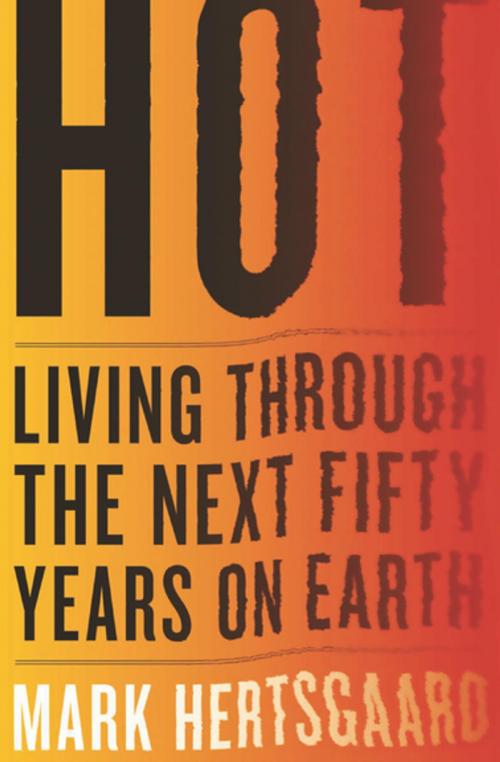Hot
Living Through the Next Fifty Years on Earth
Nonfiction, Science & Nature, Science, Biological Sciences, Environmental Science, Social & Cultural Studies, Political Science, Government, Public Policy, Nature, Environment, Environmental Conservation & Protection| Author: | Mark Hertsgaard | ISBN: | 9780547504445 |
| Publisher: | Houghton Mifflin Harcourt | Publication: | January 19, 2011 |
| Imprint: | Mariner Books | Language: | English |
| Author: | Mark Hertsgaard |
| ISBN: | 9780547504445 |
| Publisher: | Houghton Mifflin Harcourt |
| Publication: | January 19, 2011 |
| Imprint: | Mariner Books |
| Language: | English |
An “informative and vividly reported book” that goes beyond the politics of climate change to explore practical ways we can adapt and survive (San Francisco Chronicle).
Journalist Mark Hertsgaard has reported on global warming for outlets including the New Yorker, NPR, Time, and Vanity Fair. But it was only after he became a father that he started thinking about the two billion young people worldwide who will spend the rest of their lives coping with mounting climate disruption.
In Hot, he presents a well-researched blueprint for how all of us―parents, communities, companies, and countries―can navigate this unavoidable new era. Reporting from across the nation and around the world, Hertsgaard provides examples of ambitious attempts to mitigate the effects of sea-level rise, mega-storms, famine, and other threats—and an “urgent message . . . that citizens and governments cannot afford to ignore” (The Boston Globe).
“This readable, passionate book is surprisingly optimistic: Seattle, Chicago, and New York are making long-term, comprehensive plans for flooding and drought. Impoverished farmers in the already drought-stricken African Sahel have discovered how to substantially improve yields and decrease malnutrition by growing trees among their crops, and the technique has spread across the region; Bangladeshis, some of the poorest and most flood-vulnerable yet resilient people on earth, are developing imaginative innovations such as weaving floating gardens from water hyacinth that lift with rising water. Contrasting the Netherlands’ 200-year flood plans to the New Orleans Katrina disaster, Hertsgaard points out that social structures, even more than technology, will determine success, and persuasively argues that human survival depends on bottom-up, citizen-driven government action.” —Publishers Weekly
“His analysis of the impact of global warming on industries as different as winemaking and insurance is intriguing, and his well-supported conclusion that social change can beat back climate change is inspiring . . . an exceptionally productive approach to a confounding reality.” —Booklist
“This is an important book.” —Bill McKibben
An “informative and vividly reported book” that goes beyond the politics of climate change to explore practical ways we can adapt and survive (San Francisco Chronicle).
Journalist Mark Hertsgaard has reported on global warming for outlets including the New Yorker, NPR, Time, and Vanity Fair. But it was only after he became a father that he started thinking about the two billion young people worldwide who will spend the rest of their lives coping with mounting climate disruption.
In Hot, he presents a well-researched blueprint for how all of us―parents, communities, companies, and countries―can navigate this unavoidable new era. Reporting from across the nation and around the world, Hertsgaard provides examples of ambitious attempts to mitigate the effects of sea-level rise, mega-storms, famine, and other threats—and an “urgent message . . . that citizens and governments cannot afford to ignore” (The Boston Globe).
“This readable, passionate book is surprisingly optimistic: Seattle, Chicago, and New York are making long-term, comprehensive plans for flooding and drought. Impoverished farmers in the already drought-stricken African Sahel have discovered how to substantially improve yields and decrease malnutrition by growing trees among their crops, and the technique has spread across the region; Bangladeshis, some of the poorest and most flood-vulnerable yet resilient people on earth, are developing imaginative innovations such as weaving floating gardens from water hyacinth that lift with rising water. Contrasting the Netherlands’ 200-year flood plans to the New Orleans Katrina disaster, Hertsgaard points out that social structures, even more than technology, will determine success, and persuasively argues that human survival depends on bottom-up, citizen-driven government action.” —Publishers Weekly
“His analysis of the impact of global warming on industries as different as winemaking and insurance is intriguing, and his well-supported conclusion that social change can beat back climate change is inspiring . . . an exceptionally productive approach to a confounding reality.” —Booklist
“This is an important book.” —Bill McKibben















